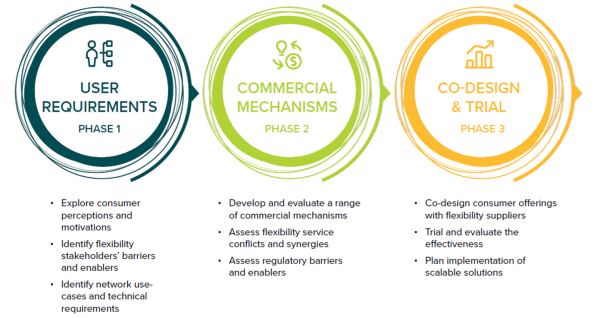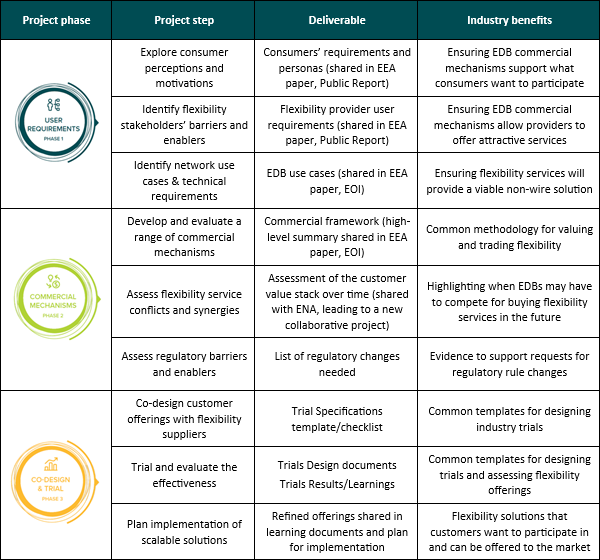Resi-Flex
About the project
Historically, electricity distribution businesses (EDBs) in Aotearoa have largely managed peak demand electricity use by managing consumers’ hot water heating through ripple relays. This has enabled deferral of network investment and helped to maintain network security. Hot water management provides a useful example of the value of modifying consumption patterns while meeting consumers’ needs.
Flexibility has been identified as central to decarbonisation in New Zealand through:
- the Ministry for the Environment’s Emissions Reduction Plan, which calls for more efficient use of New Zealand transmission and distribution infrastructure
- Boston Consulting Group's The Future is Electric, which includes high-priority actions to develop flexibility services, improve distribution peak pricing signals and smart managed tariffs to “Enable a smart electricity system”
- Transpower’s Whakamana i Te Mauri Hiko, which identifies the development of flexibility at the grid and distribution level as key deliverables.
Research by Concept Consulting found that electric vehicle charging and hot water heating will drive the majority of the increase in residential electricity demand, and will provide ~90% of the potential for flexibility from consumer appliances. However, most consumers are unaware of the existing or future value of flexibility or how this impacts their power bill.
Orion and Wellington Electricity partnered to deliver the Resi-Flex project. Resi-Flex is developing and trialling flexibility services that will allow EDBs to deliver more electricity from their existing network, avoiding expensive network reinforcement which will help to provide distribution services at a lower cost (compared to distribution services without residential demand-side flexibility).
The successful implementation of residential demand-side flexibility will also help improve network quality by providing tools to ensure that the expected rapid decarbonisation-related electricity growth remains within the network's operating limits.
The Resi-Flex project plan
The purpose of Resi-Flex is to incentivise flexibility from residential consumers by exploring commercial mechanisms in collaboration with flexibility stakeholders.
Resi-Flex utilises a learning-by-doing and exploratory approach and comprises three phases, described below, covering the following objectives:
- Understand the needs, preferences, and barriers of all stakeholders across the flexibility value chain and estimate the value of flexibility from households to all.
- Inform the development of fair and effective distribution pricing and flexibility services.
- Observe the response from real-world residential consumers to customer offerings that reflect the value of flexibility.

Each Resi-Flex project stage provides learning, tools and outcomes that will be useful for the development of demand-side flexibility for other distribution networks. The table below summarises the deliverables for each project stage and how they will support the wider development of demand-side flexibility.

Sharing what we learn
To benefit other EDBs and the wider industry, we are sharing everything we learn. We publish and present regular updates on our websites (welectricity.co.nz and oriongroup.co.nz) and with the industry through different channels (Electricity Networks Aotearoa (ENA), FlexForum, etc.).
The findings from the project through to 31 March 2025, covering Phases 1 and 2 of the project and the EOI process, are summarised in the DPP3 Innovation Allowance Close Out Report.
The project was presented by Evie Trolove (Orion) and Scott Scrimgeour (Wellington Electricity) in its early stage at the 2023 EEA Conference and won the Best Paper - Member award.
Resi-Flex deliverables are also already being reused by the industry, informing further work:
- Resi-Flex Consumer personas has been published as a summary in the Resi-Flex Public Report. It has also been shared, in its full version (detailed report), with other EDBs and has informed FlexForum and the ENA's Future Networks Forum (FNF) for their work on customer segmentation.
- Resi-Flex Commercial Framework, developed by Concept Consulting, has been transferred to the FNF project. The framework will be used as the starting point to develop an industry commercial framework and guidelines for valuing and trading EDB flexibility.



To help improve our service, what feedback can you give us about this page?